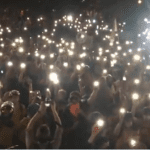This sermon, “The Butterfly Effect – Harnessing the Wind of Tiny Wings,” is part of a four-part series in the Season of Creation. This sermon is for Wilderness Sunday. Part One of the series is Finding Eden’s Forests in the Midst of COVID19. Part Two is The Heart of the Earth: Jesus, Land, and Hope.
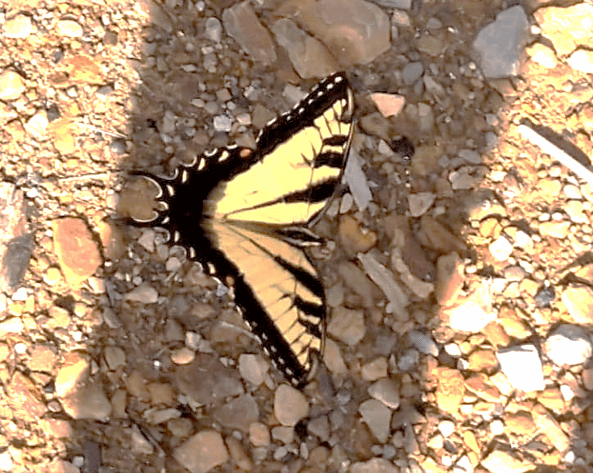
Texts: Joel 1:1-12; 19-20 and Matthew 3:13 – 4:1
The Butterfly Effect – unintended consequences
Have you heard of the term “The Butterfly Effect”? It’s a beautiful, poetic phrase describing a phenomenon in chaos theory. It’s when a small change at one place can result in huge changes in another time or place. A seemingly inconsequential variable can alter the course of events in unexpected ways. So, in theory, the fluttering of a butterfly’s wings can trigger a hurricane in a far distant time and place.
Scientists are understanding more and more about how the inhabitants of this planet are affected by – and contributing to – this “butterfly effect.” We’re seeing the results of countless little decisions on a tragic trajectory. They are the choices of sometimes mindless, sometimes intentional, human domination. Something seemingly harmless turns out to contribute to the greenhouse effect and global warming. Like driving our cars to the grocery store. Or eating hamburgers. Or drilling for methane gas. There is an undeniable interconnectedness of our consumption patterns, economic structures, and cultural habits. Combined, they have unintended consequences that affect our human and Earth communities in destructive ways.
With that in mind, the prophet Joel’s lament seems perfectly written for us today.
To you, O LORD, I cry.
For fire has devoured the pastures of the wilderness, and flames have burned all the trees of the field.
Even the wild animals cry to you because the watercourses are dried up, and fire has devoured the pastures of the wilderness.
(Joel 1:19-20)
Flight Behavior

There is a book by Barbara Kingsolver called Flight Behavior that illustrates this “butterfly effect” and how our choices can result in devastation for people halfway around the globe. Kingsolver’s novel tells the story of a woman named Dellarobia Turnbow. She’s a stay-at-home wife and mother of two young children living among the rural poor along the foothills of southern Appalachia in Tennessee. One day she has a seemingly miraculous encounter with a stunning colony of migrating monarch butterflies on a wilderness mountain owned by her in-laws. Her discovery of these wondrous undulating curtains of orange and black butterflies spread out over the mountain fills her with awe and mystery.
But, to her dismay, the “butterfly lady,” as she comes to be known, learns that the presence of the butterflies is no miracle.
Instead, it’s the result of a tragedy.
The monarchs have lost their habitat in South America because of humans destroying the forest wilderness in which they live. On top of this, climate change has skewed their internal homing patterns. That’s how they end up on her family’s mountain – a place they were never meant to be.
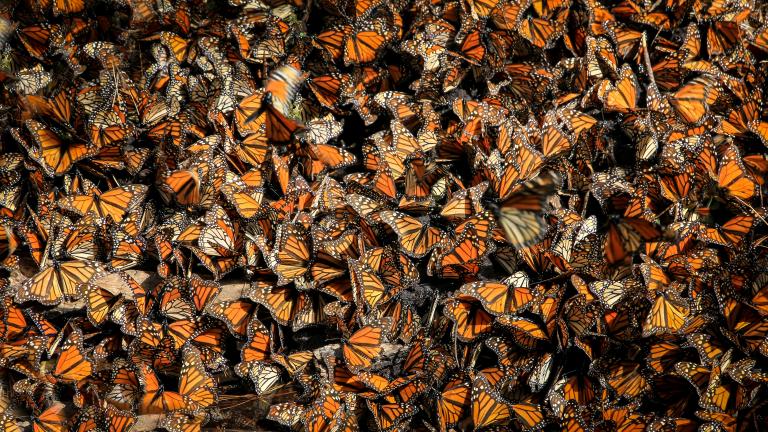
As tourists, environmentalists, and scientists flock to her family’s mountain, the Turnbows are faced with their own loss of home and land. Dellarobia’s father-in-law weighs whether or not to turn the mountain over to a logging company in order to pay off their crushing debt on his struggling farm. It’s a double-bind. Do they kill the forests that sustains them in exchange for temporary financial relief? Or do they protect the resources of their land while being buried under the burdens heaped upon them by the financial Pharaohs of our time?
When would you prefer your devastating loss: now or later?
The answer to this question is a choice that benefits only those who hold the financial reigns over us all. The powers that control our global economy wreak economic – and ecological – violence. This has devastating effects on the poor around the world and the planet’s biotic communities. In the wake of neoliberalism which came to prominence in the early 1980’s under the Thatcher and Reagan administrations, radical capitalism has gained ascendency. This results in “‘free trade,’ financialization of economies, and the external debt of many impoverished nations.” (Moe-Lobeda, 27).[3]
Global exchange
Kingsolver’s chapter, “Global Exchange,” ilustrates the entanglement of economic and ecological violence. While Christmas shopping at a dollar store for their children, Dellarobia and her husband Cub are arguing about whether or not he should oppose his father’s intent to log their land. As they debate, Dellarobia sees the inextricable link between her cash-starved family and the plight of people halfway around the world:
“Here’s your Christmas stuff,” Cub said, waving at the aisles. Nobody could argue that one. The store contained enough plastic baubles to cover a hayfield.
“Great,” she said. “Family heirlooms made by slave children in China.” . . . She looked over the bins of tinselly junk and felt despair, trying to find one single thing that wouldn’t fall apart before you got it home . . . [T]here had to be armies of factory workers making this slapdash stuff, underpaid people cranking out things for underpaid people to buy and use up, living their lives mostly to cancel each other out. A worldwide entrapment of bottom feeders,” (Kingsolver, 157-9).
If you’re like me, thinking about these things may fill you with feelings of guilt, powerlessness, and hopelessness.
But here’s the thing. Guilt in and of itself does not accomplish anything. What we need is action that leads to transformation. We need ways to reconcile humanity to the planet and the Earth-community. We need strategies of hope and narratives of action to enable us to see what living differently and restructuring a more just global society might look like.
Ecotheologian Cynthia Moe-Lobeda says that “corporate-and-finance-driven global capitalism is not an impenetrable fortress,” (Moe-Lobeda, xix). She insists that ordinary citizens informed by what she calls “critical mystical vision” and empowered by a “justice-making love” can help bring about change.
We need a more equitable society to avoid depleting the life-giving energies of this planet.
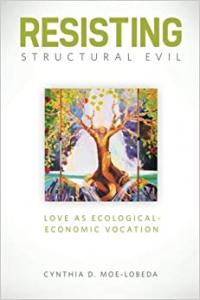
In her book, Resisting Structural Evil: Love as Ecological-Economic Vocation, Moe-Lobeda shares ideas for Christians to enact and live out the critical mystical vision she has in mind. These include conversations in church Bible study groups. Divesting from companies that impose atrocious working conditions on women, children and people in impoverished countries. And aligning with advocacy and justice groups working to change international policies and improve workers’ lives and environmental conditions.
Moe-Lobeda’s book gives readers an array of possibilities for changing their relationship with the goods they purchase (or not), the people who make them, and the Earth that produces the resources to create them. Most importantly, it changes our relationship with the Divine Source whose intention is for the healthy flourishing of all peoples and biotic systems.
Both Kingsolver’s and Moe-Lobeda’s books lead us to imagine new ways to reshape our individual and community patterns to bring about substantive equitable change.
Each of them offers pointed critiques of the way in which long-cherished beliefs can be excuses for inaction or co-opted by financial powers to ensure continued domination. Yet they see possibilities for the church and our faith to help us find innovative ways through the conundrum of unsatisfactory choices. There are ways in which religion and spirituality can build bridges of prophetic understanding and reconciliation on a personal, community, and planetary level.
For example, Moe-Lobeda offers an expanded understanding of salvation “to include not only liberation from oppression but also liberation from committing or perpetrating it” (Moe-Lobeda, 59). She states that “salvation entails the restoration of the entire created world to one in which none flourish by degrading others or otherkind,” (ibid).
The Butterfly Effect of salvation
This kind of salvation shows up in Kingsolver’s book in various ways. For example, the pastor of the Turnbow’s church becomes a surprisingly effective ally in Dellarobia’s efforts to preserve her family’s land. Pastor Bobby seamlessly and subtly weaves themes of Creation-care and grace into his preaching and pastoral care.
Dellarobia herself finds salvation not just within her congregation. She finds salvation through the discipline of observation and hypothesis. Yes — science!
Learning and courage are the wings that lift Dellarobia out of her treadmill of poverty and disempowerment. This happens even as the world she knows – the world we all know – is changing, in many ways, for the worse. I won’t give the ending away. But there is a kind of baptism that happens at the conclusion of the book. Like Jesus’s baptism at the Jordan River, it is cleansing and inaugurates a new life. But it also turns the world upside down. Jesus went to the wilderness after his baptism. Similarly, Dellarobia also faces a wilderness ahead. But there is something in her resolve that filled me with courage to face our wilderness here and now.
Harnessing the Butterfly Effect
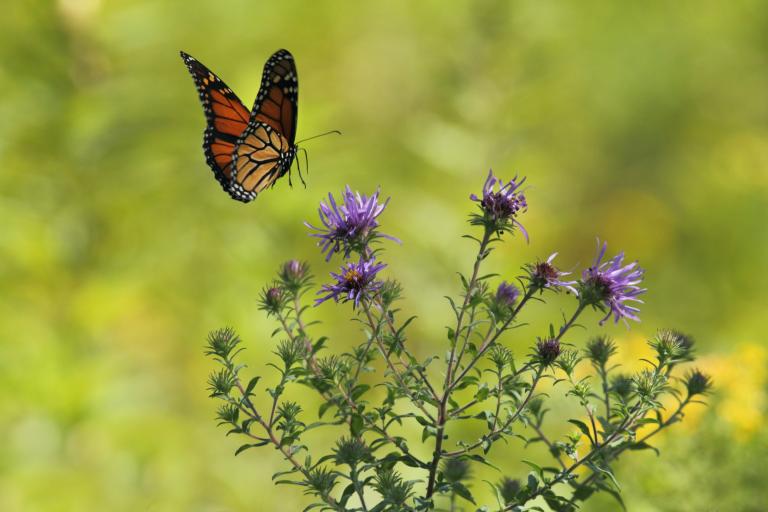
The current state of ecologic/economic crisis is the result of the accumulation of tiny human decisions. Those decisions are guided by underlying values and intentions along the way. But this “butterfly-effect” can be harnessed for good. It can help create a future guided along a different trajectory from what we have known thus far. Moe-Lobeda puts it this way. “One aspect of Christianity (and of some other religions) that breeds hope is the claim that we are called toward some form of union with the great power of life, the source of all, what many call God. We are destined to be with or fully a part of the Holy Source, and that union begins this side of death.” (Moe-Lobeda, 138).
As we watch Dellarobia begin to think differently, she makes brave choices and practices alternatives in her own life. Of course, we know that these small things alone will not suddenly bring about the systemic changes that are needed.
Yet, these little changes are crucial.
They move “us toward more viable, accountable, and ecologically healthy economies on a large scale. These alternatives signal that a different way is possible” (Moe-Lobeda, 281). That’s where we find the hope and optimism that characterize both Moe-Lobeda’s and Kingsolver’s books.
You see, we are part of the butterfly effect as well.
God is harnessing the wind of our tiny wings.
As individuals and communities living toward God’s salvation of the planet, we are part of a “butterfly effect” of neighbor-love that arises and moves across this planet. God can use even the fluttering of butterflies’ wings to positively affect the patterns of this planet. Fellow butterflies – tender, tremulous, and tenacious – it’s time to take flight!
Read also:
Chaos Theory and the Butterfly Effect: Why Easter Still Matters

Leah D. Schade is the Assistant Professor of Preaching and Worship at Lexington Theological Seminary in Kentucky and ordained in the ELCA. Dr. Schade does not speak for LTS or the ELCA; her opinions are her own. She is the author of Preaching in the Purple Zone: Ministry in the Red-Blue Divide (Rowman & Littlefield, 2019) and Creation-Crisis Preaching: Ecology, Theology, and the Pulpit (Chalice Press, 2015). She is also the co-editor of Rooted and Rising: Voices of Courage in a Time of Climate Crisis (Rowman & Littlefield, 2019).
Twitter: @LeahSchade
Facebook: https://www.facebook.com/LeahDSchade/


